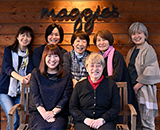
Award summary
Located in Toyosu in the Koto Ward of Tokyo, Maggie's Tokyo is a free facility that all people affected by cancer, including cancer patients and their family members and friends, can easily drop by, talk with nurses and psychologists and relax over a cup of tea. This third place, neither a hospital nor home, opened in October 2016 and more than 37,000 people have visited it.
Maggie's Tokyo is the first Maggie's Cancer Caring Centre (hereinafter "Maggie's Centre") facility in Japan. Maggie's Centre is a British institution. Maggie's Centre was established in Edinburgh in 1996. Based on her experience fighting cancer, founder Maggie Keswick Jencks wished to create a place to be human, not a patient, and to have people who could guide her like a friend. Today, Maggie's Center has expanded to 27 locations worldwide, mainly in the United Kingdom.
Maggie's Tokyo provides human support to the users of the facility so they can regain their strength in a space that has been carefully created to enable visitors to feel at peace and relaxed, surrounded by a garden that was designed after the Maggie's Centre's concept that conveys the atmospheres of the four seasons. Nurses and psychologists that have in-depth knowledge of cancer empathetically listen to visitors. A few words and casual conversation may help visitors dispel their worries and organize their thoughts. When users visit the facility again, they are ready to ask more specific questions and gradually regain their strength.
Maggie's Tokyo is open from 10 a.m. until 4 p.m. on weekdays. Basically its services are available to people who visit the facility, but it currently also provides consultation services via telephone, email and the internet. It is open in the evening twice a month, from 6 p.m. to 8 p.m. on the first and third Fridays of the month. Maggie's Tokyo also provides a wide variety of support services, such as sharing tips for living while being treated for cancer, finding practical, psychological and social support services and many different group-based programs on relaxation, food and nutrition, stress management, hormone therapy and other issues. The facility is operated by 30 people including seven nurses, two psychologists, one public health nurse and about 20 part-time registered dietitians and office workers.
Ms. Masako Akiyama is the 72-year-old head of Maggie's Center and a co-representative director. She was dedicated to the establishment of the facility in Japan. When she was 39, Ms. Akiyama took care of her older sister at home in the end stages of cancer. The experience led her to begin to provide at-home care services based in Shinjuku Ward in 1992. However, the reality that she saw was that patients were spending the remaining portion of their lives unable to talk about their problems and concerns. She realized the need for a point of contact other than hospitals that the patients could feel free to seek advice from. In 2008, she spoke at the international seminar on cancer care and met another speaker, Andrew Anderson from Maggie's Centre. She was aligned with the ways that Anderson provided support to enable people to independently think about issues and regain their strength. Ms. Akiyama visited her British counterpart the following year and, in 2011, opened Kurashi no Hokenshitsu, a consultation office modeled after Maggie's Centre. There she met Ms. Miho Suzuki, a TV journalist who had experienced cancer and came to report on the consultation office. Ms. Akiyama gained another likeminded friend and set up Maggie's Tokyo, the 20th Maggie's facility globally and the first of its kind in Japan.
Mainstream cancer treatment has shifted to outpatient care. Tough choices and decisions about living while being treated for cancer are often left to lonely patients. Amid this change, Ms. Akiyama believes that consultative support, where both the people asking for advice and the people advising them think together and cooperate, is becoming increasingly important. Maggie's Support Training is held once a year for people involved in consultative support at hospitals and in communities around the country and Ms. Akiyama continues to expand her network.
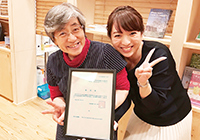 A chance meeting with Ms. Miho Suzuki led to the establishment of Maggie's Tokyo, the first of its kind in Japan.
A chance meeting with Ms. Miho Suzuki led to the establishment of Maggie's Tokyo, the first of its kind in Japan.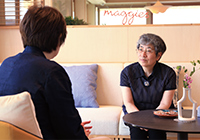 She attentively listens to a visitor and provides support.
She attentively listens to a visitor and provides support.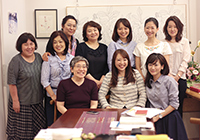 Working with members engaging in administration affairs.
Working with members engaging in administration affairs.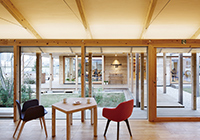 The space, carefully designed in terms of architecture and environment, can be your rock.
The space, carefully designed in terms of architecture and environment, can be your rock.Reasons for this award
In this era of living with cancer, how we handle the disease is extremely important. This is why Maggie's Tokyo, which is characteristically sincere and empathetic to patients, is very important. Many people have been mentally saved in this place. Institutions like this where people can come for advice on any issue are still limited in number. This is something that the Japanese healthcare system lacks. In that regard, Ms. Akiyama's activities are one answer. We are also impressed by Ms. Akiyama's ideas as a nurse and by her actions. She led the establishment of the facility.
Comments from the winner
The news of the award came suddenly. It was really a surprise. When I learned of how and why I had been selected, I shared my joy with my colleagues. We have built an environment that is like another home for people with cancer and where they can overcome their mountain of worries and regain their strength. Furthermore, we run it as a charity. I am grateful that the awarding organization paid attention to these points. Winning the award will help us keep going.






